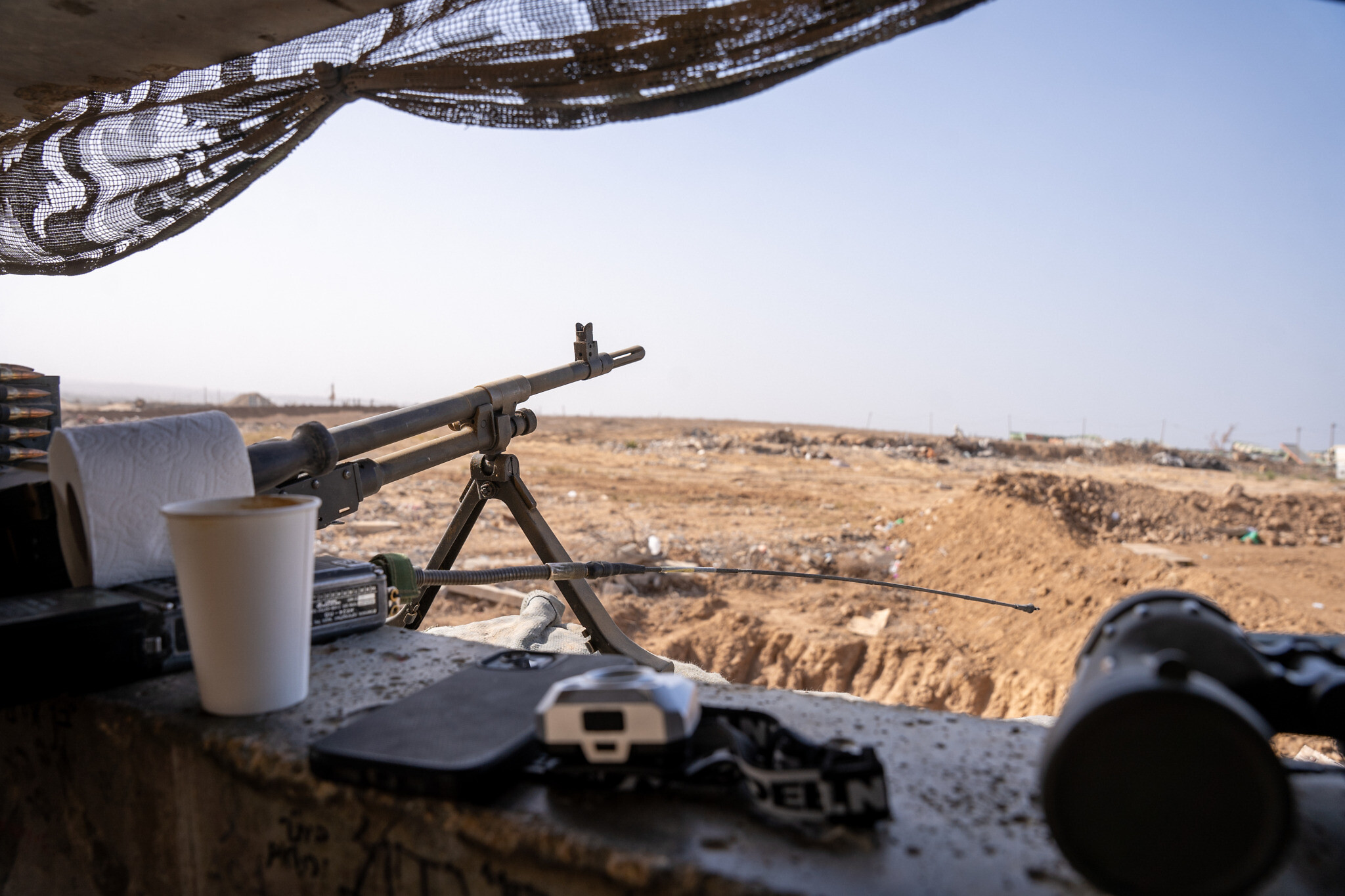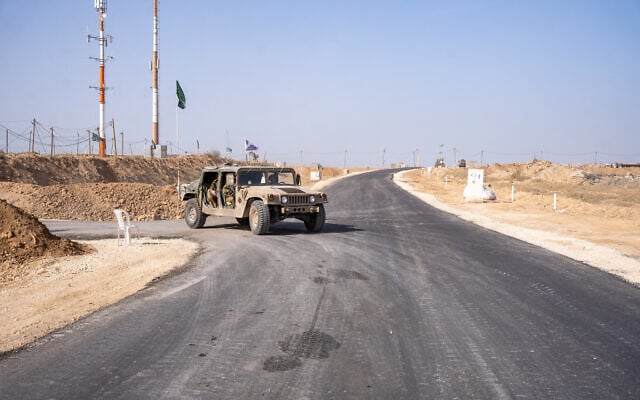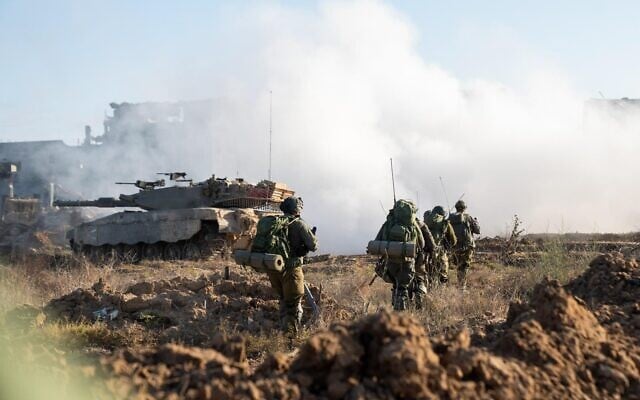



An Israeli reservist soldier told the UK’s Sky News broadcaster that troops are haphazardly shooting civilians in the Gaza Strip, where loose rules of engagement enable deadly fire at anyone who enters no-go zones.
The soldier spoke on camera in English, but anonymously, and the footage was blurred to obscure his identity in the interview broadcast on Monday.
He described his firsthand experiences while serving with the 252nd Division in the Gaza Strip, where he was twice posted at the Netzarim Corridor, a strategic route that bisects the territory into northern and southern sections.
The soldier said troops open fire on anyone who enters defined no-zones around their positions, even if they do not appear to pose a threat.
“We have a territory that we are in, and the commands are: everyone that comes inside needs to die,” he said. “If they’re inside, they’re dangerous, you need to kill them. No matter who it is.”
“It was like pretty much everyone that comes into the territory, and it might be like a teenager riding his bicycle,” he said.
His remarks matched those made by other soldiers in the division last year, as reported by the Haaretz daily in December and January, in which they criticized open-fire rules and the division commander, Brig. Gen. Yehuda Vach.
“There’s an imaginary line that they tell us all the Gazan people know it, and that they know they are not allowed to pass it,” said the soldier, who had three tours of duty in Gaza. “But how can they know?”
“They [commanders] don’t really talk to you about civilians that may come to your place. Like I was in the Netzarim road, and they say if someone comes here, it means that he knows he shouldn’t be there, and if he still comes, it means he’s a terrorist,” he said.
He said the looseness of open-fire orders depended on individual commanders, with some being more lax than others.
“They might be shot, they might be captured,” he said of those who entered the zones. “It really depends on the day, the mood of the commander.”
“So it’s kind of like the Wild West,” he said. “Some commanders can really decide to do war crimes and bad things and don’t face the consequences of that.”
He described an occasion where a man entered the no-go area and was shot dead, but another who approached the body was instead taken captive. Hours later, orders were issued to again fatally shoot anyone in the area.
Israel launched its campaign in Gaza following the October 7, 2023, Hamas assault on southern Israel, in which some 1,200 people were killed and 251 were taken hostage.
Fellow soldiers had an attitude that all Gazans are terrorists, even those who were clearly unarmed civilians, a view that commanders did not oppose and some even backed, the anonymous soldier said.
Others saw all Gazans as guilty of the October 7 atrocities because they did not prevent it or supported Hamas’s attack, he said.
“I think a lot of them really felt like they were doing something good,” the soldier said. “I think the core of it, that in their mind, these people aren’t innocent.”
“This is what they tell you. But I don’t really think it’s true. It’s just poor people, civilians that don’t really have too many choices.”
Explaining his decision to go public with his experiences, he said he felt like he had taken part in “something bad, and I need to counter it with something good that I do, by speaking out.
“I am very troubled about what I took and still am taking part of, as a soldier and citizen in this country,” he said.
Public support in Israel is focused on waging what is seen as a just war and on freeing the hostages, he assessed.
“I think a lot of people, if they knew exactly what’s happening, it wouldn’t go down very well for them, and they wouldn’t agree with it. I hope that by speaking of it, it can change how things are being done.”
In a statement to Sky, the IDF stressed that it “operates against military targets and objectives, and does not target civilians or civilian objects.”
The military “operates in strict accordance with its rules of engagement and international law, taking feasible precautions to mitigate civilian harm.”
“Reports and complaints regarding the violation of international law by the IDF are transferred to the relevant authorities responsible for examining exceptional incidents that occurred during the war,” it said.
In a December report, Haaretz cited soldiers saying the open-fire orders in the 252nd Division make killing in some areas seemingly indiscriminate and casual. Another report in January had soldiers accusing Vach of endangering the lives of troops with an aggressive attitude to operations and sending forces into combat areas without adequate preparation.
On Friday the IDF confirmed it had opened a probe into allegations that troops are using deadly fire on aid-seeking Gazans, but vociferously denied that troops are being ordered by commanders to deliberately open fire on Palestinian civilians trying to reach aid centers.
The statement was issued after Haaretz reported that the military had launched a probe into potential war crimes committed by its troops and quoted unidentified soldiers as saying that the area was a “killing field” and that they were ordered to treat the aid seekers like combatants and use heavy live fire for crowd control.
Terror groups in the Gaza Strip are still holding 50 hostages, including 49 of the 251 abducted by Hamas-led terrorists on October 7, 2023. They include the bodies of at least 28 confirmed dead by the IDF. Twenty are believed to be alive and there are grave concerns for the well-being of two others, Israeli officials have said. Hamas is also holding the body of an IDF soldier killed in Gaza in 2014.
The Hamas-run Gaza health ministry says more than 56,000 people in the Strip have been killed or are presumed dead in the fighting so far, though the toll cannot be verified and does not differentiate between civilians and fighters. Israel says it has killed some 20,000 combatants in battle as of January and another 1,600 terrorists inside Israel during the October 7 onslaught.
Israel has said it seeks to minimize civilian fatalities and stresses that Hamas uses Gaza’s civilians as human shields, fighting from civilian areas, including homes, hospitals, schools, and mosques.


